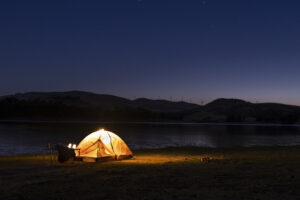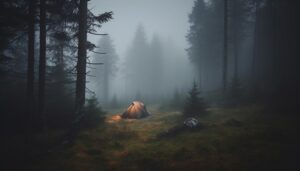Camping is an exciting experience that lets you relax from the stress of everyday life, reconnect with nature, and make lifelong memories with your loved ones. Although there are many experiences to be had in the great outdoors, it’s important to put safety first to make sure your camping vacation is safe as well as fun. Whether you’re an experienced camper or a newbie outdoors enthusiast, it’s critical to adhere to safety regulations. Let’s go over important camping safety advice in this camping guide to make sure you have a worry-free and safe time outdoors.

-
Choose a Safe Campsite:
The cornerstone of a safe camping vacation is choosing the appropriate campground. Take into account the following elements:
- Close to Water Sources: To prevent unexpected water surges or flooding, camp far enough away from lakes, rivers, or streams.
- Terrain: For a pleasant resting surface and to avoid mishaps, use flat ground.
- Wildlife Awareness: Be aware of potential wildlife encounters in the area and take appropriate safety measures.
-
Weather Preparedness:
The outside weather is subject to sudden changes. Remain knowledgeable and organized:
- Check the prediction: Before and throughout your camping vacation, keep an eye on the weather prediction.
- Emergency Shelter: Bring a strong tent or shelter that is weatherproof in case you need an emergency refuge.
- Layered Clothes: Bring rain gear and warm layers, as well as clothes appropriate for a range of weather conditions.
-
First Aid Kit Essentials:
A fully supplied first aid kit is a must while going camping.
Add:
- Sterile gauze and bandages: for cuts, scratches, and wounds.
- Antiseptic Ointments and Wipes: To stop infections.
- Painkillers and Medications: Treat everyday illnesses.
- Tweezers and Scissors: Tweezers and scissors are helpful tools for cutting bandages and extracting splinters.
-
Campfire Safety:
Although they are a camping tradition, campfires can be dangerous if not handled properly:
- Designated Fire Pit: A specific fire pit should be used, and it should be kept safely away from tents and other combustible objects.
- Extinguishing Equipment: To put out a fire fast, keep a bucket of water or sand close by.
- Supervision: Make sure the campfire is extinguished before going to bed or leaving the campground. Never leave a campfire alone.
-
Navigation Tools:
Lostness in the outdoors is a serious problem.
Get ready:
- Map and Compass: Bring a compass and a thorough map of the region for reference.
- GPS Device: Real-time location data may be obtained using a GPS device or a smartphone equipped with a dependable navigation app.

-
Hydration and Water Safety:
It’s critical to stay hydrated, but it’s also critical to protect your water sources:
- Water Purification: To ensure that the water is safe to drink, bring filters or tablets.
- Maintain Proper Hydration: Especially in hot conditions, make sure you drink enough water throughout the day.
-
Wildlife Awareness:
A safe camping experience depends on respecting wildlife’s natural habitat:
- Food Storage: To keep animals away from your campground, store food in safe containers.
- Observe from a Distance: Remain cautious and keep your distance from animals to appreciate them from up close.
-
Communication Devices:
Make sure, particularly in isolated places, that you can communicate with the outside world:
- Phone: Always keep a fully charged phone with emergency numbers on it.
- Emergency Radio: For communication and weather updates, think about getting a battery-powered emergency radio.
-
Proper Lighting:
Enough illumination is necessary to navigate the campground at night.
- Headlamps or Flashlights: Always carry dependable light sources with spare batteries, such as headlamps or flashlights.
- Glow Sticks: Mark roads and tent positions with glow sticks.
-
Leave No Trace:
Camping responsibly means reducing your environmental impact:
- Pack Out rubbish: Remove all of your rubbish and bring reusable bags for waste.
- Remain on designated routes: To protect the ecology, stay on designated routes and refrain from trampling on any plant.

When You Choose Camp George Everest
Any outdoor setting, including Camp George Everest, should provide a pleasurable, serene, and adventurous camping experience. By putting safety first and following the camping guide, you protect not only yourself and your friends but also help to preserve the environment. Accept the natural world’s beauty in moderation, and make every camping trip an exciting and safe excursion into the middle of the wilderness.
